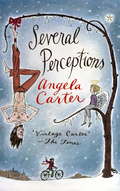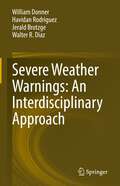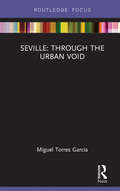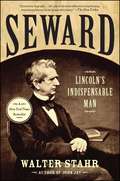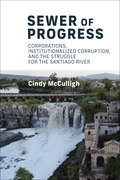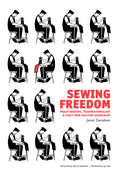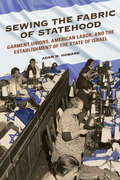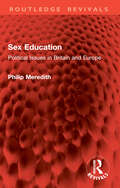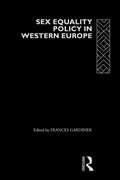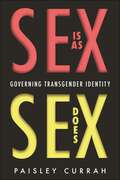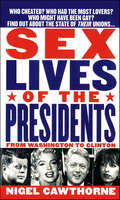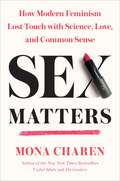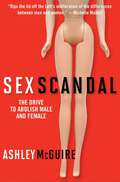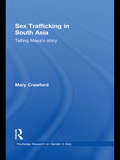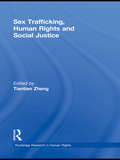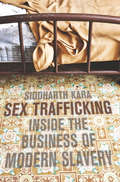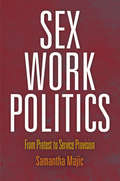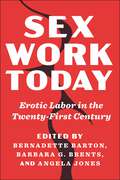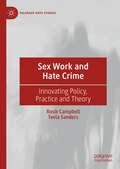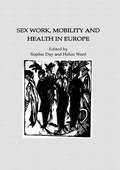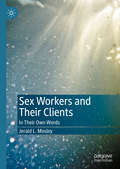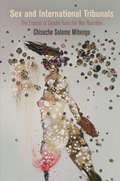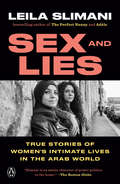- Table View
- List View
Several Perceptions (Virago Modern Classics #75)
by Angela CarterCentre stage in Angela Carter's unruly tale of the Flower Power Generation is Joseph - a decadent, disorientated rebel without a cause. A self-styled nihilist whose girlfriend has abandoned him, Joseph has decided to give up existing. But his concerned friends and neighbours have other plans.In an effort to join in the spirit of protest which motivates his contemporaries, Joseph frees a badger from the local zoo; sends a turd airmail to the President of the United States; falls in love with the mother of his best friend; and, accompanied by the strains of an old man's violin, celebrates Christmas Eve in a bewildering state of sexual discovery. But has he found the Meaning of Life?
Severe Weather Warnings: An Interdisciplinary Approach
by William Donner Havidan Rodriguez Jerald Brotzge Walter R. DiazThis book offers a comprehensive description and analysis of natural hazard warnings, drawing on perspectives from the social sciences, physical sciences, and interdisciplinary fields such as disaster studies to articulate a distinction between traditional warnings and what might be called interdisciplinary warnings. Traditional warnings approach warning technology, design, and application from a principally scientific and technical perspective. Human factors, while considered, often are of secondary concern. Interdisciplinary warnings, on the other hand, maintain a critical emphasis on the technical merits of warning systems, but also ask, “Will psychological and community factors such as culture and structure shape how the system is used, and, if so, can this information be incorporated into system design preemptively to make it more effective?” Given the absence of systematic work on interdisciplinary warnings, a book-length monograph discussing and synthesizing knowledge from the various fields focused on warnings and warning response is of critical importance to both academics and practitioners. Broadly conceived, the book presents readers with an in-depth overview of warnings, interdisciplinary research, and interdisciplinary collaboration. The book holds appeal for a very broad audience: scholars; practitioners; and academic, vocational, and technical instructors both in University and non-University settings. It is of interest to academic scholars due to the interdisciplinary treatment of warnings as well as the general presentation of up-to-date scholarship on warning theory. Additionally, scholars interested in interdisciplinary work in general and those focusing on disaster warnings find within the volume a framework for developing collaborative research partnerships with those from other disciplines. As well, the book offers practitioners --emergency managers, mitigation specialists, planners, etc. --a more comprehensive perspective on emergency response in practice, allowing for better development and application of warning policy. Finally, the book appeals to instructors both inside and outside the academy. The authors envision the book useful to professors teaching both graduate and undergraduate-level courses in Sociology of Disaster, Emergency Management Planning, Homeland Security, Disaster Response, Disaster Mitigation, and Business Continuity and Crisis Management. A robust market also exists among professional organizations, perhaps most notably FEMA, which offers countless online and in-person training courses via the National Training Program, Emergency Management Institute (EMI), and other venues.
Seville: Through the Urban Void (Built Environment City Studies)
by Miguel TorresRecent years have seen a growing interest in undetermined and unqualified urban spaces. Understanding cities as spaces for encounter, conflict and otherness, this book argues that this indeterminacy is not marginal but a key characteristic of urban space, and degrees of liberty foster change, creativity, and political action. The urban void is a conceptual construct that aims to render a principle of absence apprehensible, and to describe how it intervenes in place-making in the city. Seville: Through the Urban Void build mostly upon Henri Lefebvre’s work using concepts drawn on the social sciences, in order to articulate a biographic narrative of the Alameda de Hércules in Seville, Spain, which stands both as an outstanding instance of urban space and a very influential urban type. During its long historical span the Alameda has undergone alternating periods of decline and development, revealing the relations between successive urban paradigms and ideas of nature, territory, and the people. For the first time its whole history is told in a single account, which adds new perspectives to its understanding, and brings forward formerly disregarded aspects. This book shows how its liminal nature, which stubbornly persists over time, creates the conditions for creative processes.
Seville: Through the Urban Void (Built Environment City Studies)
by Miguel TorresRecent years have seen a growing interest in undetermined and unqualified urban spaces. Understanding cities as spaces for encounter, conflict and otherness, this book argues that this indeterminacy is not marginal but a key characteristic of urban space, and degrees of liberty foster change, creativity, and political action. The urban void is a conceptual construct that aims to render a principle of absence apprehensible, and to describe how it intervenes in place-making in the city.Seville: Through the Urban Void build mostly upon Henri Lefebvre’s work using concepts drawn on the social sciences, in order to articulate a biographic narrative of the Alameda de Hércules in Seville, Spain, which stands both as an outstanding instance of urban space and a very influential urban type. During its long historical span the Alameda has undergone alternating periods of decline and development, revealing the relations between successive urban paradigms and ideas of nature, territory, and the people. For the first time its whole history is told in a single account, which adds new perspectives to its understanding, and brings forward formerly disregarded aspects. This book shows how its liminal nature, which stubbornly persists over time, creates the conditions for creative processes.
Seward: Lincoln's Indispensable Man
by Walter StahrFrom one of our most acclaimed new biographers– the first full life of the leader of Lincoln’s “team of rivals” to appear in more than forty years. William Henry Seward was one of the most important Americans of the nineteenth century. Progressive governor of New York and outspoken U.S. senator, he was the odds-on favorite to win the 1860 Republican nomination for president. As secretary of state and Lincoln’s closest adviser during the Civil War, Seward not only managed foreign affairs but had a substantial role in military, political, and personnel matters.Some of Lincoln’s critics even saw Seward, erroneously, as the power behind the throne; this is why John Wilkes Booth and his colleagues attempted to kill Seward as well as Lincoln. Seward survived the assassin’s attack, continued as secretary of state, and emerged as a staunch supporter of President Andrew Johnson, Lincoln’s controversial successor. Through his purchase of Alaska (“Seward’s Folly”), and his groundwork for the purchase of the Canal Zone and other territory, Seward set America on course to become a world empire.Seward was not only important, he was fascinating. Most nights this well-known raconteur with unruly hair and untidy clothes would gather diplomats, soldiers, politicians, or actors around his table to enjoy a cigar, a drink, and a good story. Drawing on hundreds of sources not available to or neglected by previous biographers, Walter Stahr sheds new light on this complex and central figure, as well as on pivotal events of the Civil War and its aftermath.
Sewer of Progress: Corporations, Institutionalized Corruption, and the Struggle for the Santiago Ri ver
by Cindy McCullighA creative and comprehensive exploration of the institutional forces undermining the management of environments critical to public health.For almost two decades, the citizens of Western Mexico have called for a cleanup of the Santiago River, a water source so polluted it emanates an overwhelming acidic stench. Toxic clouds of foam lift off the river in a strong wind. In Sewer of Progress, Cindy McCulligh examines why industrial dumping continues in the Santiago despite the corporate embrace of social responsibility and regulatory frameworks intended to mitigate environmental damage. The fault, she finds, lies in a disingenuous discourse of progress and development that privileges capitalist growth over the health and well-being of ecosystems. Rooted in research on institutional behavior and corporate business practices, Sewer of Progress exposes a type of regulatory greenwashing that allows authorities to deflect accusations of environmental dumping while &“regulated&” dumping continues in an environment of legal certainty. For transnational corporations, this type of simulation allows companies to take advantage of double standards in environmental regulations, while presenting themselves as socially responsible and green global actors. Through this inversion, the Santiago and other rivers in Mexico have become sewers for urban and industrial waste. Institutionalized corruption, a concept McCulligh introduces in the book, is the main culprit, a system that permits and normalizes environmental degradation, specifically in the creation and enforcement of a regulatory framework for wastewater discharge that prioritizes private interests over the common good.Through a research paradigm based in institutional ethnography and political ecology, Sewer of Progress provides a critical, in-depth look at the power relations subverting the role of the state in environmental regulation and the maintenance of public health.
Sewing Freedom
by Barry Pateman Jared DavidsonSewing Freedom is the first in-depth study of anarchism in New Zealand during the turbulent years of the early 20th century-a time of wildcat strikes, industrial warfare, and a radical working class counter-culture. Interweaving biography, cultural history, and an array of archival sources, this engaging account unravels the anarchist-cum-bomber stereotype by piecing together the life of Philip Josephs-a Latvian-born Jewish tailor, antimilitarist, and founder of the Wellington Freedom Group. Anarchists like Josephs not only existed in the 'Workingman's Paradise' that was New Zealand, but were a lively part of its labour movement and the class struggle that swept through the country, imparting uncredited influence and ideas. Sewing Freedom places this neglected movement within the global anarchist upsurge, and unearths the colourful activities of New Zealand's most radical advocates for social and economic change. Includes illustrations by Icky from Justseeds and a foreword by Barry Pateman (Kate Sharpley Library Archivist and Associate Editor at the Emma Goldman Papers)."Davidson has produced much more than a soundly researched and very engaging biography... this is an excellent, wide-ranging contribution to our knowledge of the international (and indeed transnational) anarchist movement, and sweeps us along in a fascinating story that takes us from the pogroms in Russian Latvia, to the working-class slums of Victorian Glasgow, to the early struggles of the nascent labour movement in New Zealand."-Dr David Berry, author of A History of the French Anarchist Movement"Many millions of words have been written on New Zealand history. The labour movement does not feature prominently in this vast corpus; in fact, quite the contrary. And within this relatively sparse coverage, anarchism is almost invariably assigned at best a passing mention. We must be grateful for Davidson's determination to restore an anarchist voice to the history of the outermost reach of the British Empire."-Dr Richard Hill, Professor of New Zealand Studies & author of Iron Hand in the Velvet Glove"A ground breaking tale of a rebel life, skillfully unearthed by Jared Davidson. A must read."-Lucien van der Walt, co-author of Black Flame
Sewing the Fabric of Statehood: Garment Unions, American Labor, and the Establishment of the State of Israel (The Working Class in American History)
by Adam M HowardLong a bastion of Jewish labor power, garment unions provided financial and political aid essential to founding and building the nation of Israel. Throughout the project, Jewish labor often operated outside of official channels as non-governmental organizations. Adam Howard explores the untold story of how three influential garment unions worked alone and with other Jewish labor organizations in support of a new Jewish state. Sewing the Fabric of Statehood reveals a coalition at work on multiple fronts. Sustained efforts convinced the AFL and CIO to support Jewish development in Palestine through land purchases for Jewish workers and encouraged the construction of trade schools and cultural centers. Other activists, meanwhile, directed massive economic aid to Histadrut, the General Federation of Jewish Workers in Palestine, or pressured the British and American governments to recognize Israel's independence. What emerges is a powerful account of the motivations and ideals that led American labor to forge its own foreign policy and reshape both the postwar world and Jewish history.
Sex Education: Political Issues in Britain and Europe (Routledge Revivals)
by Philip MeredithIn the book Sex Education (first published in 1989), Philip Meredith focuses upon the British situation to investigate the political management of school sex education. The author presents new insights into the problems of state provision of an aspect of education which many feel should be the exclusive domain of parents. He explores the hidden political dynamics which dictate and influence the moral debate over the theory and practice of sex education and argues for a more rational involvement of government in resolving the problems of practice.The book includes comparative details of political management and curriculum design, drawn mainly from Sweden, Denmark, the Federal Republic of Germany, Poland, and Belgium, which clarifies or provides alternatives to the British handling of the subject. Basing his recommendations on these examples of more constructive management of sex education, Philip Meredith challenges the government to take a more positive role by delegating policy decision-making in this area to a nationally representative, independent, and authoritative body of experts, whose deliberations the government would defend against minority moral interests who wield a disproportionate power.
Sex Equality Policy in Western Europe (Routledge/ECPR Studies in European Political Science)
by Frances GardinerThis book presents a wide-ranging comparative analysis of the development of sex-equality policies within Europe. The contributors, comprising both European and US-based scholars, address a very current political issue. This is an area of policy that has reached the decision-making stage in much of Europe and it is thus possible to assess the outcome of policy-making and to account for cross-national variations of sex-equality policy measures.The contributors discuss the similarities and differences in levels of awareness, commitment to equality of opportunity and readiness to turn rhetoric into reality in a number of west European countries, including Spain, the Netherlands, Britain, Norway and Ireland.
Sex Is as Sex Does: Governing Transgender Identity
by Paisley CurrahWinner, Sexuality and Politics Book Award - American Political Science AssociationFinalist, PROSE Award - Government and PoliticsWhat the evolving fight for transgender rights reveals about government power, regulations, and the lawEvery government agency in the United States, from Homeland Security to Departments of Motor Vehicles, has the authority to make its own rules for sex classification. Many transgender people find themselves in the bizarre situation of having different sex classifications on different documents. Whether you can change your legal sex to “F” or “M” (or more recently “X”) depends on what state you live in, what jurisdiction you were born in, and what government agency you’re dealing with. In Sex Is as Sex Does, noted transgender advocate and scholar Paisley Currah explores this deeply flawed system, showing why it fails transgender and non-binary people. Providing examples from different states, government agencies, and court cases, Currah explains how transgender people struggle to navigate this confusing and contradictory web of legal rules, definitions, and classifications. Unlike most gender scholars, who are concerned with what the concepts of sex and gender really mean, Currah is more interested in what the category of “sex” does for governments. What does “sex” do on our driver’s licenses, in how we play sports, in how we access health care, or in the bathroom we use? Why do prisons have very different rules than social service agencies? Why is there such resistance to people changing their sex designation? Or to dropping it from identity documents altogether? In this thought-provoking and original volume, Sex Is as Sex Does reveals the hidden logics that have governed sex classification policies in the United States and shows what the regulation of transgender identity can tell us about society’s approach to sex and gender writ large.Ultimately, Currah demonstrates that, because the difficulties transgender people face are not just the result of transphobia but also stem from larger injustices, an identity-based transgender rights movement will not, by itself, be up to the task of resolving them.
Sex Lives of the Presidents: From Washington to Clinton
by Nigel CawthorneIt didn't start with Clinton, or even Kennedy. Ever since the Father of our Country was sworn in over 200 years ago, the White House has seen its share of oversexed, adulterous, philandering presidents. From Washington's countless bed partners to Jefferson's illegitimate children, Kennedy's notorious womanizing to Clinton's unstoppable libido, find out the surprising and sometimes bizarre sexual practices of all the men in the Oval Office.
Sex Matters: How Modern Feminism Lost Touch with Science, Love, and Common Sense
by Mona CharenAuthor of the New York Times bestseller Useful Idiots and popular columnist Mona Charen takes a close, reasoned look at the aggressive feminist agenda undermining the success and happiness of men and women across the countryIn this smart, deeply necessary critique, Mona Charen unpacks the ways feminism fails us at home, in the workplace, and in our personal relationships--by promising that we can have it all, do it all, and be it all. Here, she upends the feminist agenda and the liberal conversation surrounding women's issues by asking tough and crucial questions, such as: * Did women's full equality require the total destruction of the nuclear family? * Did it require a sexual revolution that would dismantle traditions of modesty, courtship, and fidelity that had characterized relations between the sexes for centuries? * Did it cause the broken dating culture and the rape crisis on our college campuses? * Did it require war between the sexes that would deem men the "enemy" of women? * Have the strides of feminism made women happier in their home and work life. (The answer is No.)Sex Matters tracks the price we have paid for denying sex differences and stoking the war of the sexes--family breakdown, declining female happiness, aimlessness among men, and increasing inequality. Marshaling copious social science research as well as her own experience as a professional as well as a wife and mother, Mona Charen calls for a sexual ceasefire for the sake of women, men, and children.
Sex Scandal: The Drive to Abolish Male and Female
by Ashley McguireMen and women used to cheer: vive la différence!But now, contrary to all science and common sense, we’re supposed to believe that there is no difference. (And if you insist there is, you just might be accused of a hate crime!)Our culture-and our laws-are endorsing a worldview rooted in craziness.For instance, we’re told that: Boys who think they’re girls (and who could change their minds tomorrow) should be allowed to participate in girls’ sports-and shower in their locker rooms Expectant mothers are now "birthing individuals” Coed college dorm rooms and bathrooms are great, but single-sex clubs are a campus danger It’s horrible for stores to have separate boys and girls clothing departments (let alone toy sections) It would be a great idea for our military to lower physical standards and push young women and mothers into combat roles in the militaryIf you think that’s insanity, you’re not alone, but you might be surprised at just how widespread-and successful-this lunatic campaign has become.In her compelling new book, Sex Scandal, journalist Ashley McGuire takes this radical campaign to task and reveals: How so-called "gender-norming” flies in the face of science (which is proving that men and women are even more different than commonly acknowledged) Why-especially if you have kids-it’s almost impossible to avoid the dangerous consequences of a "gender neutral” world How embracing sexual differences can make policing safer, government more efficient-and hedge funds lose less money How "gender neutrality” is making women more vulnerable to violence How the word "gender”-formerly a grammatical term-has been used to dismiss the reality of definite, biological "sex” (male and female) with fluid "gender identities” Why "gender” insanity is not something we can just ignore and hope will fade away, but need to refute-now-with hard, cold facts before it does any more damage (which it likely will)Sex Scandal: The Drive to Abolish Male and Female is packed with news-breaking interviews, shocking examples, and "inconvenient” facts that everyone needs to read-and act on.
Sex Trafficking in South Asia: Telling Maya's Story (Routledge Research on Gender in Asia Series)
by Mary CrawfordThis book is a critical feminist analysis of sex trafficking. Arguing that trafficking in girls and women is a product of the social construction of gender and other dimensions of power and status within a particular culture and at a particular historical moment, this book offers the necessary locally grounded analysis. Focusing on the case of Nepal, from where 5,000 to 7,000 thousands of Nepali girls and women are trafficked each year primarily to India, Mary Crawford assesses how the social construction of trafficking - the concept and its representation in discourse - are influenced by the dynamics of gender, caste, and the development establishment. The defining figure is an innocent, naïve young girl being lured or duped into leaving the safety of her village. The trafficking victim is portrayed as "backward"; however, she is "backward" in specific ways that resonate with Nepal’s struggle to resist and yet encompass Western influence. This view may lead to paradoxical effects in which efforts to protect girls and women instead restrict their human rights. Rather than seeing women as universalized victims, Crawford assesses how the social construction of trafficking in a particular society affects girls and women who live in that society. In this book, the author’s voice as a woman, a feminist, and a social scientist immersed in a "foreign" way of life, illuminates aspects of this process and highlights the subjectivity of urban women. It makes the connection between Nepali subjectivities and a problem of international significance, the trafficking of girls and women. The book provides a model for other locally grounded accounts of sex trafficking to counter the universalizing rhetoric of the mass media and some anti-trafficking activists, filling a niche in South Asian Studies and Women’s Studies.
Sex Trafficking, Human Rights, and Social Justice (Routledge Research in Human Rights)
by Tiantian ZhengThe recognition of women’s human rights to migrate and work as sex workers is disregarded and dismissed by anti-trafficking discourses of rescue in the latest United Nation’s definition of trafficking. This volume explores the life experiences, agency, and human rights of trafficked women in order to shed light on the complicated processes in which anti-trafficking, human rights and social justice are intersected. In these articles, the authors critically analyze not only the conflation of trafficking with sex work in international and national discourses and its effects on migrant women, but also the global anti-trafficking policy and the root causes for the undocumented migration and employment. Featuring case studies on eleven countries including the US, Iran, Denmark, Paris, Hong Kong, and south east Asia and offering perspectives from transnational migrant population, the contributors rearticulate the trafficking discourses away from the state control of immigration and the global policing of borders, and reassert the social justice and the needs, agency, and human rights of migrant and working communities. This book will be of interest to students and scholars of politics, gender studies, human rights, migration, sociology and anthropology.
Sex Trafficking: Inside the Business of Modern Slavery
by Siddharth KaraEvery year, hundreds of thousands of women and children are abducted, deceived, seduced, or sold into forced prostitution, coerced to service hundreds if not thousands of men before being discarded. These trafficked sex slaves form the backbone of one of the world's most profitable illicit enterprises and generate huge profits for their exploiters, for unlike narcotics, which must be grown, harvested, refined, and packaged, sex slaves require no such "processing," and can be repeatedly "consumed."Kara first encountered the horrors of slavery in a Bosnian refugee camp in 1995. Subsequently, in the first journey of its kind, he traveled across four continents to investigate these crimes and take stock of their devastating human toll. Kara made several trips to India, Nepal, Burma, Thailand, Laos, Vietnam, the United Kingdom, Italy, the Netherlands, Denmark, Albania, Moldova, Mexico, and the United States. He witnessed firsthand the sale of human beings into slavery, interviewed over four hundred slaves, and confronted some of those who trafficked and exploited them.In this book, Kara provides a riveting account of his journey into this unconscionable industry, sharing the moving stories of its victims and revealing the shocking conditions of their exploitation. He draws on his background in finance, economics, and law to provide the first ever business analysis of contemporary slavery worldwide, focusing on its most profitable and barbaric form: sex trafficking. Kara describes the local factors and global economic forces that gave rise to this and other forms of modern slavery over the past two decades and quantifies, for the first time, the size, growth, and profitability of each industry. Finally, he identifies the sectors of the sex trafficking industry that would be hardest hit by specifically designed interventions and recommends the specific legal, tactical, and policy measures that would target these vulnerable sectors and help to abolish this form of slavery, once and for all.The author will donate a portion of the proceeds of this book to the anti-slavery organization, Free the Slaves.
Sex Work Politics
by Samantha MajicIn San Francisco, the St. James Infirmary (SJI) and the California Prostitutes Education Project (CAL-PEP) provide free, nonjudgmental medical care, counseling, and other health and social services by and for sex workers--a radical political commitment at odds with government policies that criminalize prostitution. To maintain and expand these much-needed services and to qualify for funding from state, federal, and local authorities, such organizations must comply with federal and state regulations for nonprofits. In Sex Work Politics, Samantha Majic investigates the way nonprofit organizations negotiate their governmental obligations while maintaining their commitment to outreach and advocacy for sex workers' rights as well as broader sociopolitical change.Drawing on multimethod qualitative research, Majic outlines the strategies that CAL-PEP and SJI employ to balance the conflicting demands of service and advocacy, which include treating sex work as labor with legitimate occupational health and safety concerns, empowering their clients with civic skills to advance their political commitments outside the nonprofit organization, and conducting and publishing research and analysis to inform the public and policymakers of their constituents' needs. Challenging the assumption that activists must "sell out" and abandon radical politics to manage formal organizations, Majic comes to the surprising conclusion that it is indeed possible to maintain effective advocacy and key social movement values, beliefs, and practices, even while partnering with government agencies. Sex Work Politics significantly contributes to studies of transformational politics with its nuanced portrait of nonprofits as centers capable of sustaining political and social change.
Sex Work Today: Erotic Labor in the Twenty-First Century
by Bernadette Barton, Barbara G. Brents, and Angela JonesA cutting-edge volume on current trends in sex work, from sugar relationships and cyber brothels to financial domination, sex worker activism, and feminist pornSex is for sale in more ways than ever. It can be bought and sold online, in sex clubs, on the street, and around the world. As with many industries, discrimination, exploitation, and inequality persist in sex work. Yet it also offers autonomy, job satisfaction, and even pleasurable experiences for those involved. Sex Work Today explores these contradictions, offering an intimate look at the benefits and challenges of sex work across geographic contexts.Featuring thirty-one original essays by sex workers, advocates, researchers, and activists, Sex Work Today is the first compilation of research on new forms of digital sex such as camming, sugar dating, and AI sex dolls. Providing a lens to understand contemporary labor dynamics and the nature of sex work itself, this collection captures formerly ignored aspects of the sex industry including: fatphobia and disability; transmasculine and nonbinary sex workers; racialized emotional labor in the digital sex industry; high job satisfaction among professional dominatrixes; and sex worker scholars.With federal policies ostensibly aimed at combating sex trafficking–affecting all sex workers–understanding this industry is more vital than ever. Decentering Western, white, cisgender voices, Sex Work Today underscores the global repercussions of these misaligned policies, which make sex work more challenging and less safe, and provides valuable insights for those seeking to shape policies, challenge prejudices, and foster a safer and more equitable world for all.
Sex Work and Hate Crime: Innovating Policy, Practice and Theory (Palgrave Hate Studies)
by Teela Sanders Rosie CampbellThis book brings together literature, empirical research findings from two projects, and policy analysis to examine how some forces in England have adopted the approach of treating crimes against sex workers as hate crimes. This book identifies some of the benefits of the hate crime approach to crimes against sex workers, both operationally and for some of the victims of crime. The authors argue that the hate crime approach should not be seen as an alternative to decriminalisation of sex work but can provide a pathway to achieving more sensitive but robust policing of crimes against sex workers and support in accessing justice through the criminal justice system. They also examine the broader context of hate crime policy and scholarship as they debate the relevance, problems and merits of the sex work hate crime model. The book provides another dimension to current theoretical and policy debates about widening definitions and law around hate crime to include other groups beyond existing protected characteristics.
Sex Work, Mobility & Health
by SophieFirst published in 2004. Routledge is an imprint of Taylor & Francis, an informa company.
Sex Workers and Their Clients: In Their Own Words
by Jerald L. MosleyThis book draws on the voices of sex workers and their clients to critically assess the criminalization of prostitution in favour of decriminalization. It does so by contrasting their voices with the claims made by prohibitionists: those advocating the prohibition of prostitution or, at least, the prohibition of the purchase of sexual services, and notes scholarly research that gives context to those accounts and claims. Each chapter is dedicated to a particular issue which is given currency in academic and public debates on sex work. The first part of each chapter reviews the state of research and publicly-aired contentions and the second part compares sex workers' voices with claims from prohibitionists. It highlights the gap between what many sex workers have to say about themselves and what theorizing prohibitionists say about all prostitution. It argues that there is often a striking contrast in attitude, perspective, interpretation and valuation. This books speaks primarily to prohibitionist thinking and sex work stereotyping and, secondarily, to the debate on decriminalization of sex work.
Sex and Film
by Barry ForshawSex and Film is a frank, comprehensive analysis of the cinema's love affair with the erotic. Forshaw's lively study moves from the sexual abandon of the 1930s to filmmakers' circumvention of censorship, the demolition of taboos by arthouse directors and pornographic films, and an examination of how explicit imagery invaded modern mainstream cinema.
Sex and International Tribunals: The Erasure of Gender from the War Narrative (Pennsylvania Studies in Human Rights)
by Chiseche Salome MibengeBefore the twenty-first century, there was little legal precedent for the prosecution of sexual violence as a war crime. Now, international tribunals have the potential to help make sense of political violence against both men and women; they have the power to uphold victims' claims and to convict the leaders and choreographers of systematic atrocity. However, by privileging certain accounts of violence over others, tribunals more often confirm outmoded gender norms, consigning women to permanent rape victim status.In Sex and International Tribunals, Chiseche Salome Mibenge identifies the cultural assumptions behind the legal profession's claims to impartiality and universality. Focusing on the postwar tribunals in Rwanda and Sierra Leone, Mibenge mines the transcripts of local and supranational criminal trials and truth and reconciliation commissions in order to identify and closely examine legal definitions of forced marriage, sexual enslavement, and the conscription of children that overlook the gendered experiences of armed conflict beyond the mass rape of women and girls. In many cases, a single rape conviction constitutes sufficient proof that gender-based violence has been mainstreamed into the prosecution of war crimes. Drawing on anthropological research in African conflicts, and feminist theory, Mibenge challenges legal narratives that reinscribe essentialized notions of gender in the conduct and resolution of violent conflict and uncovers the suppressed testimonies of men and women who are unwilling or unable to recite the legal scripts that would elevate them to the status of victimhood recognized by an international and humanitarian audience.At a moment when international intervention in conflicts is increasingly an option, Sex and International Tribunals points the way to a more nuanced and just response from courts.
Sex and Lies: True Stories of Women's Intimate Lives in the Arab World
by Leila Slimani"As revealing as Lisa Taddeo's bestseller Three Women, but it has a more urgent political mission." --Evening Standard A fearless exposé of the secrets and lies of women's intimate lives, by the bestselling author of The Perfect Nanny and Adèle "All those in positions of authority--politicians, parents, teachers--maintain the same line: 'Do what you like, but do it in private.' " Leila Slimani was in her native Morocco promoting her novel Adèle, about a woman addicted to sex, when she began meeting women who confided the dark secrets of their sexual lives. In Morocco, adultery, abortion, homosexuality, prostitution, and sex outside of marriage are all punishable by law, and women have only two choices: They can be wives or virgins. Sex and Lies combines vivid, often harrowing testimonies with Slimani's passionate and intelligent commentary to make a galvanizing case for a sexual revolution in the Arab world.
